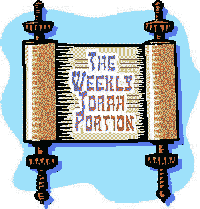|
The Element of Sacrafice
By Avi Lazerson
This week's portion continues to speak about the various sacrafices that were offered on the Altar. In verse Leviticus 6:2, the Torah stipulates that the sacrifice should remain on the fire-wood all night. The word for fire-wood, mokdah is written in the Torah with a small mem, the first letter. This is according to the tradition handed down to us from Moses on Mount Sinai.
The Rebbe of Kotzk, who lived approximately 150 years ago, comments that this is to teach us that a person should act with special zeal while fulfilling a Divine command. That is the reason that the fire-wood is to be kept burning through the night. Even through the darkest times we must always have fiery zeal in our actions.
But the small mem comes to teach us that the fiery zeal should remain concealed within us. It should not be something readily seen by an outsider. It is to be used only for our service to the Creator, and not for showing off.
In our time it is common for people to openly show their religious enthusiasm. Unfortunately, not each religious zealot has altruistic motives. Some like the attention, others enjoy feeling that they are self-sacrificing for G-d.
The Kotzker Rebbe used to say, "Do your mitzvots (religious acts) in private, and your avairas (sins) in public. Why? Because it is easy for a person to show off his religious observance to the public. Let him serve G-d sincerely, and to insure his sincerity, just to do it between him and G-d.
Let him do his sins in public. Most people hide when doing a sin. They are ashamed. Therefore do it in front of your friends - it will reduce the amount of sins.
This is the special message of the small letter in the Torah scroll. May we all take it to heart.
Sacrifice and Repentance.
by Michael Chessen
In general terms, Western Civilization
has a misguided notion regarding the Torah's approach to individuals who
have committed a sin. The popular understanding of "the mark of Cain" is
the marking of an individual who was "branded" as the prototype first
sinner. A simple reading of the text, however, reveals that God only
marked Cain in order to protect him and help him to survive his
punishment, not to shame him. His spiritual debt was exclusively a matter
between him and God.
It is important to note that today's
prayer liturgy, a continuation of the rites of sacrifice described in the
book of Leviticus, treats sin and repentance as a collective rather than a
private concern. Our recital of words of contrition is in the plural,
rather than in the singular; for whatever an individual needs to seek
specific individual forgiveness, he or she does so by way of silent
additional thought and concentration.
We find the antecedents of the sinner's
right to anonymous repentance in this week's Torah reading, Tzav. The book
of Leviticus initially describes the procedure for bringing the burnt
offering sacrifice. In Tzav, the Torah gives further elaboration
concerning the sin offering, stressing that it is to be slaughtered in the
same place as the burnt offering, thus ensuring that sin of deed need not
be recognized or distinguished from sin of thought.
An apparent contradiction to this
principle could be discerned in the language of the commandment concerning
the offering for the priests' anointment. In the wake of the sin of the
Golden Calf, Aaron explained to Moses that "this"(molten image) had
emerged from the gold he had thrown into the fire. God now declares that
"this" is the offering of Aaron (Leviticus 5:13) and demonstrates a very
important principle in Judaism. By using Aaron's language God changes it
and shows us how sincere repentance retroactively transforms misdeeds into
positive commandments. Because of the need to convey this message, and
because Aaron's repentance was really the repentance of the Jewish people
as a whole, God necessarily made it public.
In our time, diligent study of the
sacrifices serves to strengthen our intention in prayer and helps bring us
closer to Aaron's level of complete repentance.
Wishing you all a Shabbat Shalom!

|
